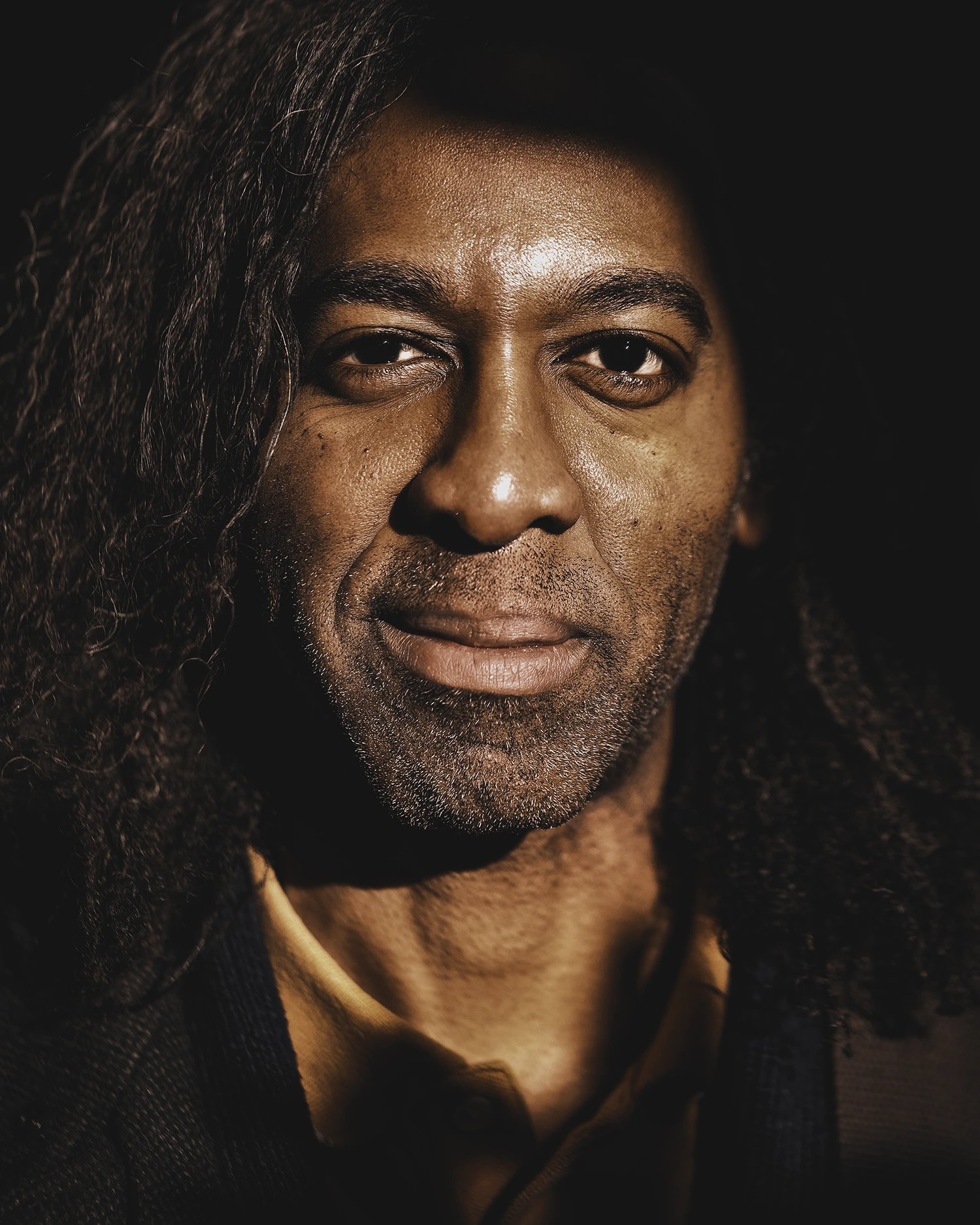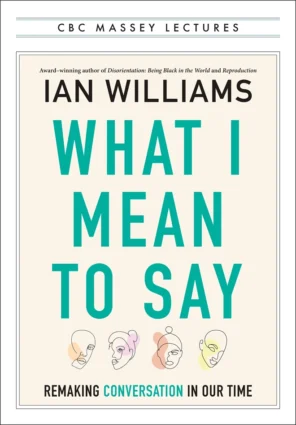
The Lost Art of Conversation
Ian Williams makes the case for talking to each other more meaningfully Read More
In his book What I Mean to Say: Remaking Conversation in Our Time (2024), Ian Williams, a professor of English at the University of Toronto, argues that polarized politics and online echo chambers are devaluing how we speak – and listen – to each other. In this Q&A with editor-in-chief Scott Anderson, he reflects on the importance of conversation to the human spirit, the challenge of listening in a distracted world and the role universities can play in elevating the tone of debate.
What prompted you to write a book about conversation?
A number of things were bothering me: our polarized politics, online hostility, widespread loneliness, book bans, censorship.
And I asked myself, ‘What do these things have in common?’ If you think of a Venn diagram, conversation is where all these issues overlap. These are all, to some degree, language and communication problems. Partly they’re ideological issues, but they’re all filtered through how we talk to each other.
We tend to underestimate how important language is. We think about its utility, its transactional value. But language is also a medium through which we experience people. We should pay closer attention to how we use it.
Do you remember good conversations you’ve had?
Yes, but I don’t hold on to specifics of conversations. I know people who can say, “Four years ago, we were in this place, and you said specifically this.” My mind doesn’t work like that.
Do you recall the feeling of having had a great conversation?
I do.
What does it mean for you?
Well, I’m not good with feelings <laughs>. But if the conversation is really good, the feeling is physical. It’s not just that you’re mentally stimulated, but it feels like some good chemicals are being released into your body.
I find they elevate my mood.
I think a good conversation reaffirms human potential: that if I extend myself toward someone and they extend themselves toward me, this whole human enterprise feels worthwhile. A good conversation can make you feel hopeful that everything is going be OK with the world. It’s energizing.
You note in the book that a conversation involves listening as well as speaking. And that having better conversations with each other might require us to become better listeners.
Good listening involves giving someone your full attention. So, it’s not me worrying right now that my winter tires will cost $600. 1 It’s about turning over all of me to this person I’m spending time with. And not holding back bits and pieces of myself.
I think we’re losing the ability to pay attention. It’s like there’s glass between people. We can see each other, but when we try to reach out, we hit a barrier that is impossible to penetrate unless we are flashing or buzzing or pinging. To sustain attention for a long time is a skill. Hopefully it’s not going to evolve out of us!
Does this challenge of attention ever come up with the students in the creative writing classes you teach at U of T?
It does. I’m not going to dump on Gen Z because I think we’re all susceptible to distraction nowadays. But I don’t think they have the same baseline that we older folks have. That’s not a brag. 2
In my poetry classes, we devote one week each to different internal capacities. Attention is one, perception is another. So, we might stand at a window and just look out for five minutes. At first, it seems interminable. But after a few minutes of sitting in silence, they start to notice things – that piece of garbage near the squirrel, for example.3
We’re teaching people to pay attention to details, to things and people that don’t scream for attention. Because in your writing you have to be able to say what differentiates this room from every other room.
We have another week on curiosity. We have a week on courage. We work on writing great sentences, too. But we’re developing capacities that make students alive to the world so that their writing is charged. Their language is sharpened. Good writers see what other people miss.

What role do you think universities can play around difficult conversations in particular?
In an ideal world, I wish universities were leading these conversations, on every front. Universities have experts in every discipline, but they have not been so good at having conversations that help people apply this expertise to their everyday lives. Instead, the media step in and reduce the complexity. Everything becomes very black and white. They try to explain the critical issues in 30 seconds and then go to a commercial break.
Universities have people who have been thinking about these things for 20 or 30 years. They can elevate the tone and complexity of the conversation.
U of T recently appointed an advisor on civil discourse. That’s important. If this initiative is done right, it could be replicated across other campuses. Universities could bring in people who are contentious and can model what respectful and civil conversations sound like. The university could be the new town square.
How do you guard against those town square discussions turning into yelling matches?
That’s a risk at first. But eventually we’ll normalize what is acceptable in this space and what’s not. Eventually, there’ll be a kind of code of conduct – a contextual pressure that there is no need to be angry. But it’s going to take some time. People can be impassioned and have strong views. But I get disturbed when conversations move into emotional territory and there’s no way to return them to logical territory.
You make a point in the book that a conversation is not the same as a debate or an argument – that it should be a process of discovery. Yet many of the issues we talk about are framed as debates: my goal is to “win” you to my point of view or vice versa.
It’s more profitable in our society to have clear sides with a winner and loser. In the early 2000s, we saw all these reality-show competitions. You couldn’t just air a talent show any more. This competitive tension has now been imported into our lives generally. 4 But not everything has to be competitive.
Our society is also obsessed with productivity. But a good conversation doesn’t always “produce” anything. Do we undervalue them as a result?
Absolutely. Conversations can seem like a waste of time. So, we often give them targets and goals. The conversation you and I are having will lead to an article. But will I spontaneously give up an hour of my day later today to talk to someone else? No. I would have to schedule it in. It hardly ever just happens.
When I was a kid – a different culture and a different time – people would just knock on the door and my mom would end up in a half-hour conversation.
My dad would say, “I’m going down the road to lime” – to hang out with his friends. And they would sit on the side of a bridge and talk about cricket or politics or whatever. And he would come back home happy. That was the world I grew up in. It was spontaneous. You didn’t need to schedule. You had time to allocate to another human in a way that I don’t see happening as much now. We need to be productive in every area of our life. You can’t just knock on your neighbour’s door to see what they’re up to.
 You talk in the book about politeness and civility. Are these necessary for a good conversation? Or can they sometimes get in the way of having a conversation at all?
You talk in the book about politeness and civility. Are these necessary for a good conversation? Or can they sometimes get in the way of having a conversation at all?
I do think we need a return to civility. To me, politeness is only the surface of a deeper value, like respect. It seems performative. Civility comes from a place of deep mutual respect: I want to hear what you have to say, and I will not be rude to you because you’re another human being. We can disagree and yet be civil.
Politeness will try to avoid any contention. Maybe another way of thinking about this is in terms of guardrails for our conversations – similar to how we’re talking about guardrails for AI. What are the guardrails for human interactions and our online interactions? What is responsible conduct? How can individuals practice this without external policing?
During the pandemic, it wasn’t uncommon for people to disengage from friends or family members whose views about vaccination differed from their own. It’s difficult to have those discussions. The choice to disengage can seem the easier path.
I’ve been thinking about this in terms of “the high road” and “the long road.” In taking the high road, I’m not going to shout at you, and I’m not going to respond to bogus facts you’re sending my way. I’m not going to get into conspiracy theories with you.
But this can seem elitist. From the other person’s point of view, it’s like I think I’m better than they are. So, instead of the high road, I think of taking the long road with people.
On the long road, I may need to disengage with you temporarily, for a month or whatever. But it doesn’t mean that I cut you off entirely; it’s not a permanent state.
Maybe I’ll sprinkle in a fact here and there when you’re talking about your kid or what’s going on at work. My goal is not to “win” the argument in three months and get you vaccinated. It’s to continue to be a reasonable person in spite of inducements for me not to be. I’m going to be reasonable and steady for as long as it takes. It means I’m prioritizing the relationship over the conversation.
I’m okay with keeping the friend whose views I don’t always agree with. I think that’s better than losing someone altogether. Otherwise, we start to be surrounded only by people who are just like us.
Toward the end of the book, you describe wanting to end a long-time friendship because you felt the relationship was no longer working for you. But then a conversation led you both to a better place.
There is a process of being heard and understood. People in marriages probably do this more often. You can disengage and walk away from an anti-vaxxer friend, but in a marriage, you have to have those conversations until you arrive at a mutual understanding. Maybe friendships should be more like marriages. We should take them more seriously.
One of the casualties of our online lives is that there is a kind of disposability built into our long-term relationships. But if I’ve known you for 25 years, that counts for something – even if I don’t like you now. There’s something there that’s worthwhile, so, no, I won’t throw you away. If the channels of the relationship are open, there’s always potential for future conversations.
What do you hope people take away from the book?
The first is that there is a group of people who are disturbed by the direction our interactions are going. There are people who want a more respectful public tone, who don’t want to assume the worst of others. You’re not alone in that.
The second is knowing that huge individual effort is going to be necessary if we want to evolve to a state that is both digitally savvy and interpersonally complex. We can opt to perform above the low standard of engagement set before us. We don’t have to degrade ourselves or others for clicks or convenience.
And, finally, I’d like to remind us that we can coexist among people who hold different views. A conversation is a single entity that can hold opposing viewpoints together. We can live in permanent conversation with the people around us.
This conversation has been condensed and edited for clarity and flow.






No Responses to “ The Lost Art of Conversation ”
Mary Anne Chambers (BA 1988 UTSC) writes:
I very much enjoyed Professor Ian Williams' conversation with Scott Anderson about "The lost art of conversation." I know I will be thinking about it for a long time and hopefully applying its 'pearls of wisdom' to my interactions with others.
I will read the book. Sounds fascinating.
I read this article with interest. During the COVID pandemic, my son Brendan and I began a weekly conversation group over coffee, and have now held more than 200 of them. It’s called “Fika Fridays” and is modeled after a Swedish tradition. Every week, between 10 and 25 random people from as many as 20 countries meet to chat – no predetermined topics, just general conversation, active listening and the exchange of tacit knowledge. You can’t find tacit knowledge with a Google search as it’s not codified; we need to talk to one another to pass this knowledge along.
I enjoyed this article, and I identify with the challenge of conversation and civility. COVID was a test -- not just of our civility with each other, but, more importantly, of trust with our government. Many folks do not trust our government to get things right, or sufficiently right.
If further research shows that the COVID vaccines that were approved and mandated for use did not have appropriate follow-up tests and studies, then our opposition will have been proven correct and civility will be in for a huge test.
F. Sigmund Topor (BA 1993 Woodsworth) writes:
That's a nice read! One thing that crossed my mind: gone are the days when a couple would go out for a meal and engage themselves in a conversation.
Social media, smartphone apps and games have reshaped how people interact, even in intimate settings like dinner dates. It’s common now to see couples sitting across from each other, both engrossed in their phones rather than engaging in conversation. This shift raises questions about how technology affects relationships.
On the one hand, it keeps people connected in ways previous generations never imagined. On the other, it can create distance in face-to-face interactions, replacing deep conversations with quick digital exchanges. I wonder if others have seen this in relationships in their circles, and what the impact is?
Remarkable.
Thank you, Ian Williams and University of Toronto Magazine, for highlighting such a complex and important topic. I appreciate the consideration and emphasis around dialogue and the importance of keepings lines of communication open but taking breaks when necessary. I really enjoyed reading this conversation.
Thank you to Ian Williams for writing this much-needed and timely book, and to University of Toronto Magazine for publishing this article.